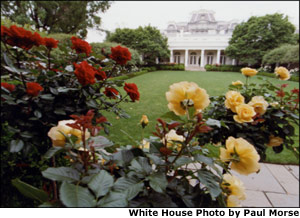
The path to the White House Rose Garden has been a bumpy one. Angela Merkel has met with Barack Obama three times in one year, but the sober East German and the charismatic African-American have never really warmed to each another. First, the chancellor didn’t want to allow then-candidate Obama to speak at Berlin’s Brandenburg Gate. Then she opted for a video-conference instead of an in-person visit to Washington. On the other hand, the president visited Baden-Baden and Dresden, but has yet to make an appearance in Berlin since his election.
But those are yesterday’s headlines; that’s old hat. That’s the official message, at any rate, as Obama prepares to receive the German chancellor tomorrow, first for a face-to-face meeting, and later for the honor of a joint press conference in the highly symbolic Rose Garden on the White House West Lawn. Both politicians are intent on ending speculation that there has been a cooling of German-American relations. Obama is looking for another European point of contact to replace besieged British Prime Minister Gordon Brown and glitzy French President Nicolas Sarkozy. Merkel is still looking to shed her image of being the best friend of unfortunate George W. Bush, especially before the coming parliamentary elections. In Dresden, Obama already told reporters, inquiring about the trans-Atlantic discord, to “just stop it.” And in the chancellor’s office, they’ve been saying for weeks that relations with Washington are developing nicely, something that implies that they didn’t start out that way.
Actually, in what will essentially be a TV show made for public consumption, hopes for any meaningful convergence between the two are likely to hit a brick wall. Despite considerable movement on the part of the United States, Obama still lags far behind European expectations when it comes to Merkel’s showcase project, environmental protection. In addition, the German government isn’t in agreement with the cheap money policies that are driving the U.S. in the economic crisis. Likewise, Merkel’s reluctance to accept Guantanamo inmates has led to trans-Atlantic misunderstandings. And in Afghanistan, Washington has a completely different understanding of burden-sharing among the allies and continues to pressure Germany to commit more troops there.
Not all differences can be ascribed to this chancellor and president, however. No German Chancellor has ever been able to get a parliamentary majority behind increasing military operations in Afghanistan. Likewise, no U.S. President has been able to bring in radical environmental protection measures without the backing of an ornery Congress. And Obama knows that Germany will be holding elections in three months, so differences of opinion are unlikely to be aired publicly. Surprising developments aren’t likely to be forthcoming during Merkel’s visit. It’s all a matter of image, as well as environmental protection.
German-American relations won’t be put to the test until the German elections are over. If events in Afghanistan, Pakistan or Iran continue to heat up, Washington will soon be expecting considerably more from a German chancellor than just a friendly smile for the cameras in the Rose Garden.

Leave a Reply
You must be logged in to post a comment.